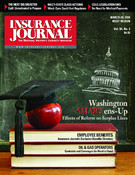Allstate Insurance Co., the National Association of Mutual Insurance Companies and the Property Casualty Insurers Association of America have joined forces requesting a review of a Court of Appeals decision involving a multi-state class action appeal currently before the Washington State Supreme Court.
The amici, or friend of the court, brief submitted by PCI and NAMIC supports a petition for discretionary review in Laughlin v. Allstate Insurance Co. According to the brief, the Court of Appeals wrongly affirmed a Washington trial court ruling that interfered with the regulation of insurance practices in other states.
Laughlin, a Washington resident, filed suit in Washington against Allstate pertaining to a contract interpretation dispute relating to an underinsured motorists coverage provision. Plaintiffs from 19 states petitioned the trial court to certify a multi-state class action.
Allstate argued that the multi-state class action did not meet the tests for certification. The differences in insurance laws and contract laws in the 19 states prevent the class from being certifiable pursuant to the statutory requirements of “commonality” and “predominance” between and among the insurance claims, it said.
The Washington trial court rejected Allstate’s arguments and certified the class. The insurer then sought discretionary review by the Court of Appeals, which granted review of only the “predominance” issue and affirmed the trial court’s ruling. Allstate then filed a petition for discretionary review with the State Supreme Court.
According to NAMIC State Affairs Manager Christian John Rataj, “Laughlin is important to the insurance industry because it raises fundamental legal questions about the constitutional principle of Federalism and the doctrine of states’ rights … Insurance consumers benefit from local regulation and adjudication of state insurance and contract law, and this case poses a serious threat to a state’s authority over its local insurance industry.”
The Amici Curiae parties argued that the granting of a multi-state class action:
- Raises significant constitutional due process of law, and commerce clause questions.
- Is inconsistent with the constitutional principle of “Comity” (the doctrine that one state should respect the legal decisions and executive actions of another state).
- Would act as an extra-territorial regulation of the department of insurance in the 19 class action states involved in the case.
“State regulators are members of their local community and have better experiential knowledge of the local insurance issues germane to the citizens of their particular state,” Rataj said. “One state court should not have the authority to interfere with another state’s regulation of its insurance industry or the adjudication of state specific insurance claims.”
View the brief at: www.namic. org/pdf/060309WashLaughlinAmiciBrief.pdf.
Topics Lawsuits Legislation Washington Market
Was this article valuable?
Here are more articles you may enjoy.


 Portugal Deadly Floods Force Evacuations, Collapse Main Highway
Portugal Deadly Floods Force Evacuations, Collapse Main Highway  A 10-Year Wait for Autonomous Vehicles to Impact Insurers, Says Fitch
A 10-Year Wait for Autonomous Vehicles to Impact Insurers, Says Fitch  What Analysts Are Saying About the 2026 P/C Insurance Market
What Analysts Are Saying About the 2026 P/C Insurance Market  Florida’s Commercial Clearinghouse Bill Stirring Up Concerns for Brokers, Regulators
Florida’s Commercial Clearinghouse Bill Stirring Up Concerns for Brokers, Regulators 


